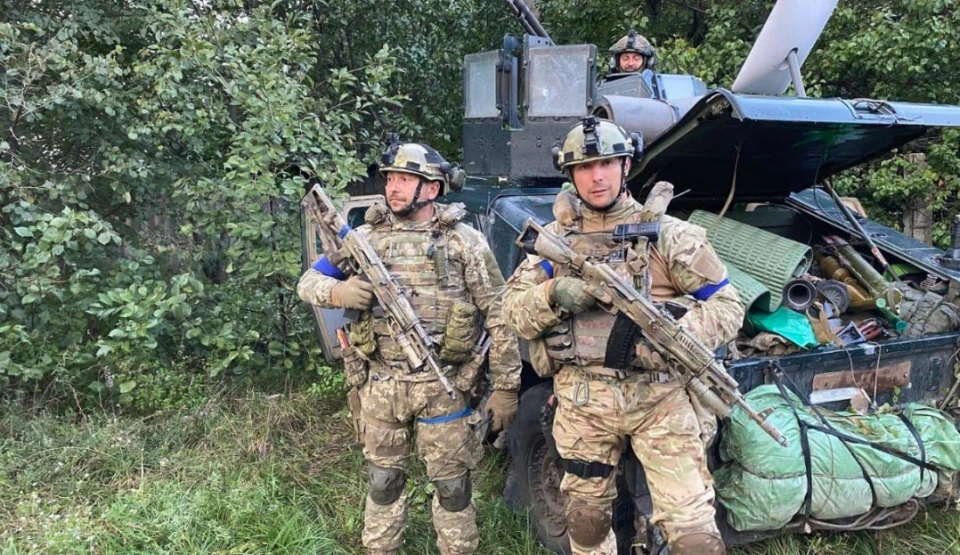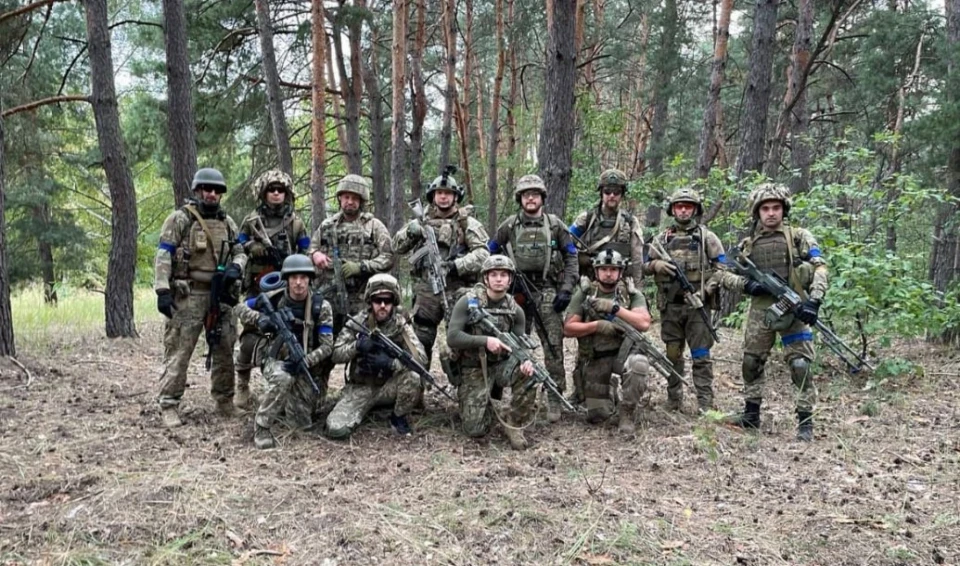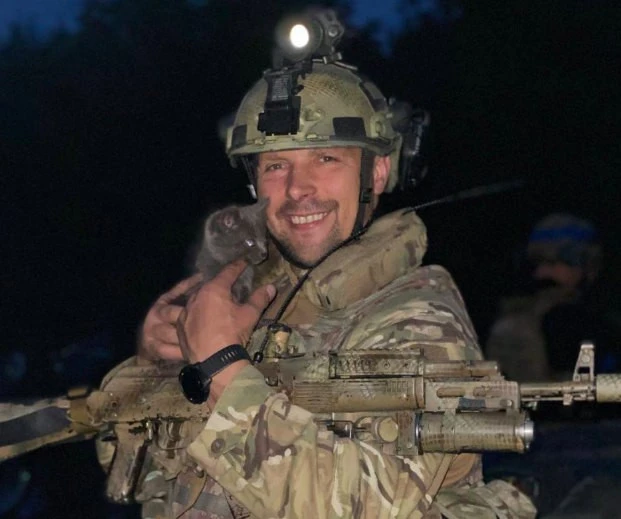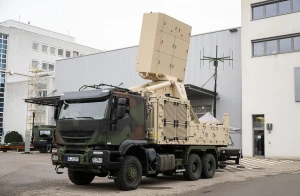
"Where Russians committed atrocities, people greeted us on knees”: Ukrainian soldier’s story
Viktor Polishchak and his 80th Air Assault Brigade freed the Kharkiv region from Russian forces
Captain Viktor Polishchak, the intelligence chief for the 1st Air Assault Battalion of Ukraine's 80th Air Assault Brigade, has served in various peacekeeping and military operations, including in Liberia and Kosovo. He later applied his skills at home, first in the Anti-Terrorist Operation and later after the full-scale invasion.
On the occasion of the 2nd anniversary of the Slobozhanshchyna counteroffensive, which began on September 6, 2022, and lasted nearly a month, Espreso spoke with scout Viktor Polishchak about his experiences, the liberation of the Kharkiv region, and how the war has evolved since the full-scale invasion began.
Viktor Polishchak is currently performing combat missions in Russia’s Kursk region. He has been in the Armed Forces for over 20 years. Throughout his service and the Russia-Ukraine war, he has received numerous awards, including the Bohdan Khmelnytsky Order for Courage, III class. He has known since childhood that he wanted to be a military man, a passion instilled in him by his grandfather and father, who were also military personnel. Notably, his grandfather was a scout during World War II.

"Since I was 10 years old, I knew what I wanted to be - I chose to be a paratrooper because the military had always been around me. A few years later, I decided I would also become a scout. Back then, working in the military was prestigious, and there was a lot of work to be done. I witnessed many events right before my eyes. I followed the news about Chechnya, for example, even though it didn’t concern us directly then,” the soldier says.
The scale of destruction in Ukraine is striking compared to other wars
The soldier expresses regret that Ukrainians have to ask their allies for weapons for so long. He notes that in the past, other countries were less concerned about wars happening far from their borders. Viktor often found himself in the midst of conflict. He gained his first experience during a peacekeeping mission in Kosovo in 2003, where he witnessed the devastating effects of war.
“When we were doing well, we didn’t have time to focus on conflicts in other countries. But as a military man, I participated in peacekeeping missions. In Kosovo, I saw the first checkpoints, ruins, and areas where there had been hostilities. While performing my tasks, I saw civilians killed. It was all bad, but seeing such things on your land is much more painful,” says Viktor Polishchak.
It's harder to see a destroyed Ukraine, not only because it’s your motherland but also because the scale of destruction and tragedy is entirely different.
“It was not even close to what we’re experiencing now. For example, if you consider Afghanistan, Chechnya, and Syria (referring to wars where Russians are consistently involved), even combined, we can’t compare to the scale of what’s happening in Ukraine, especially since 2022. The wars of the past and today’s war are completely different,” he says.
Back then, he recalls, they fought without FPV drones or Mavics, and scouts had to go behind enemy lines on foot, which was extremely dangerous and difficult. The war in Ukraine is the first to utilize these technologies on such a large scale. Therefore, Viktor Polishchak believes that in the future, many will be interested in the experience of Ukrainians.
“For instance, regarding intelligence, foreign instructors advise moving quickly, but we find it better to move slowly and quietly, like a cat. It works, but it might seem different to foreign colleagues without real practice. They will have something to learn from us, and we will learn from them. We need to focus on manufacturing weapons and developing the economy because, during the war, it takes 10 civilians to support one military person,” the soldier says.

Before the war, the army was deliberately brought “to the brink”
Viktor has never trusted Russia, a sentiment instilled in him from an early age by his family. His grandfather, who marched alongside the Russians to Berlin, watched reports from Chechnya with his grandson in the 1990s. He emphasized that Russia should not be there and that Russians cannot be trusted. Polishchak still remembers the dead bodies from those “Chechen” reports to this day.
Therefore, he was prepared to fight back against the Russians in 2014, just like his comrades from the 80th Brigade. However, he admits that the Ukrainian army as a structure was not in good shape.
“The army was driven to the brink. We were preparing our equipment for the war to have something to fight with in 2014. When we got to Donbas, the locals wanted to take pictures of the armored personnel carriers because they hadn’t seen them before. Why? Because they had been deliberately disbanded. There wasn’t a single tank or armored personnel carrier, nor any military or flight units in the Donbas or Luhansk sectors. In Kramatorsk, there was a powerful aviation unit, which was simply destroyed without a fight, as it was beneficial to Putin,” the scout recalls.
Until June, throughout the spring, the Ukrainian military merely “demonstrated the presence” of troops, but they were sorely lacking in equipment and weapons. Polishchak says that if the Russians had entered Ukraine in 2014 with the same forces as in 2022, the country would no longer exist.
“But Russians were not ready then either - neither in terms of personnel nor equipment. All these years, they had been preparing, driving Ukraine into debt to acquire missiles. If Ukrainians had had all the weapons we had in the 1990s, combined with the number of motivated people we had in 2022, the situation would have been completely different. In 2022, we had the most motivated people in the history of independence,” the soldier emphasizes.
He recalls that his first combat experience at home could have been his last. On June 3, 2014, Viktor's group was ambushed.
“The city, which was then called Krasnyi Lyman and is now just Lyman, was occupied. We were airlifted behind enemy lines by helicopters. We completed our mission, and when we returned, we received a new task - to locate the enemy’s column. As we began this task, a local taxi driver saw us. If a shepherd, a taxi driver, or an old lady spots you during reconnaissance, you have to neutralize them somehow,” the scout recalls.
At that time, they decided to let the taxi driver go, but he betrayed the Ukrainian scouts to the enemy.
“We were ambushed. We engaged in combat with the enemy at a distance of 70 meters. They had machine guns mounted on their buses, and jeeps, and positioned all along the road. We crawled along the roadside, firing back. Our guys had just taken their oaths, no one expected war in the fall,” the soldier remembers.

Kharkiv operation
During the Kharkiv counteroffensive, the scouts had a lot of work to do, recalls Viktor Polishchak.
“When the first units went to break through the front line, we went with the reconnaissance teams and then performed our tasks. Everything was not as smooth as we would have liked because our soldiers were also hitting mines and driving into minefields,” the soldier recalls.
Compared to today's operations in Kursk, Polishchak describes the Kharkiv operation as completely different.
“First of all, there is a significant difference between fighting on your own land and someone else's. And the weapons have changed in two years. In addition to ammunition, you now also need to carry electronic warfare devices and power banks. It seems harder, but there is no other way in this ‘drone war.’ The fighting in the Kharkiv region was direct. It wasn't about shooting at distant positions, it was about close combat. I was ambushing them, shooting from 5, 7, 20 meters. These were very close battles, using assault rifles. I saw their faces, they are engraved in my memory,” recalls Viktor Polishchak.
He also remembers ambushing five Russian KAMAZ trucks carrying ammunition that were heading to Izium through this direction. At that time Ukrainian defenders killed many enemies and took some prisoners.
“I remember when we entered Senkove and walked 90 kilometers in three days. The people in this village were very happy to see us. We took down the Russian flag, discarded it, hung up ours, and took our positions. The locals prepared food for us and were eager to treat us. It was clear that they had been waiting for us and were ready to help if we asked,” Viktor says.
Neither the military nor the civilians will ever forget some of the things they saw in the liberated territories.
“People were frightened, and the children - there are no words. I remember parents who had a son in the Anti-Terrorist Operation (ATO) and lost him because Russian soldiers tortured him in a special place across the river. We found him. Former ATO soldiers were being killed there, it was a terrible sight. So, in this village, where people had witnessed the atrocities of the Russians, we were greeted on the knees,” the scout says.
In the end, Viktor admits, those who survived the occupation welcomed the Ukrainian Armed Forces in the Kharkiv region in the same way.
“Those who had seen the cruelty of the Russians were eagerly awaiting liberation. Those who had cooperated with the occupying forces - cooking, transporting food, and washing clothes - said, ‘If they come, it will be fine; if you come, we will not quarrel with you.’”
However, Viktor Polishchak believes the emotions left by the Kharkiv operation are best captured in a viral video from Balakliia. It shows Ukrainian soldiers tearing down Russian symbols, with Taras Shevchenko’s poem “The Caucasus” visible underneath.
“Everyone was moved by this video. They must have covered it several times to prevent Shevchenko’s poem from being visible, but it didn't work. Because, no matter what, everything superfluous, Russian, will be removed, and we will be left with what we need,” Viktor Polishchak concluded.
- News













































